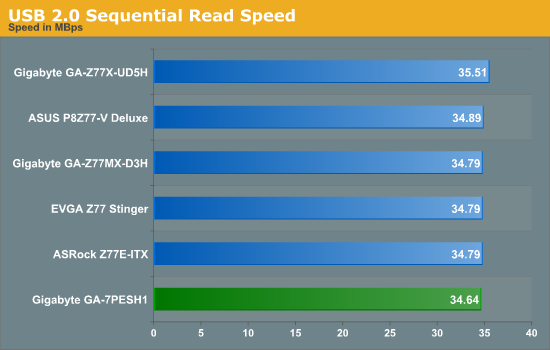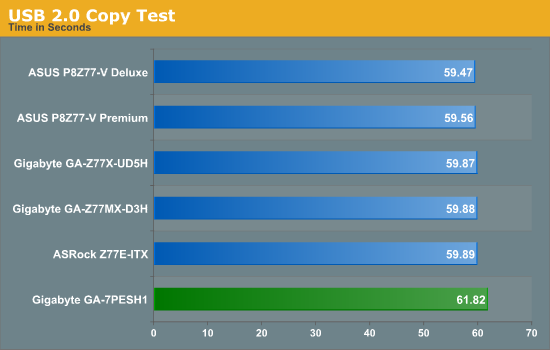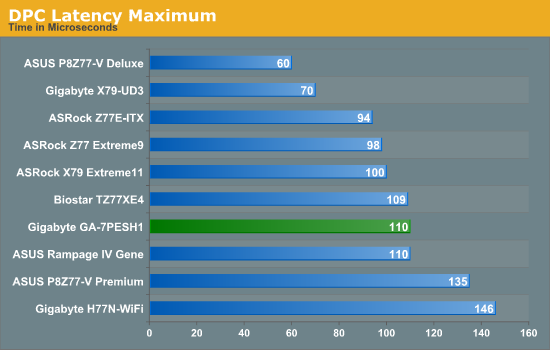Gigabyte GA-7PESH1 Review: A Dual Processor Motherboard through a Scientist’s Eyes
by Ian Cutress on January 5, 2013 10:00 AM EST- Posted in
- Motherboards
- Gigabyte
- C602
USB Speed
For this benchmark, we run CrystalDiskMark to determine the ideal sequential read and write speeds for the USB port using our 240 GB OCZ Vertex3 SSD with a SATA 6 Gbps to USB 3.0 converter. Then we transfer a set size of files from the SSD to the USB drive using DiskBench, which monitors the time taken to transfer. The files transferred are a 1.52 GB set of 2867 files across 320 folders – 95% of these files are small typical website files, and the rest (90% of the size) are the videos used in the Sorenson Squeeze test.



USB speed is dictated by the chipset and the BIOS implementation, and the GA-7PESH1 performance is comparable to our Z77/X79 testing.
DPC Latency
Deferred Procedure Call latency is a way in which Windows handles interrupt servicing. In order to wait for a processor to acknowledge the request, the system will queue all interrupt requests by priority. Critical interrupts will be handled as soon as possible, whereas lesser priority requests, such as audio, will be further down the line. So if the audio device requires data, it will have to wait until the request is processed before the buffer is filled. If the device drivers of higher priority components in a system are poorly implemented, this can cause delays in request scheduling and process time, resulting in an empty audio buffer – this leads to characteristic audible pauses, pops and clicks. Having a bigger buffer and correctly implemented system drivers obviously helps in this regard. The DPC latency checker measures how much time is processing DPCs from driver invocation – the lower the value will result in better audio transfer at smaller buffer sizes. Results are measured in microseconds and taken as the peak latency while cycling through a series of short HD videos - under 500 microseconds usually gets the green light, but the lower the better.

As a workstation motherboard, having a low DPC latency would be critical for recording and analyzing time sensitive information. Scoring 110 microseconds at its peak latency is great for this motherboard.










64 Comments
View All Comments
JonnyDough - Tuesday, January 8, 2013 - link
I don't know if I speak for everyone, but I would really love to see some gaming benchmarks.I realize that this system is not designed or optimized for gaming, but it would be interesting nonetheless to see what two processors does, or does not do for gaming. :)
npcomplete - Tuesday, January 8, 2013 - link
...it just gets to the meat of computing!Thanks for this article. It woke up the scientist in me.
esung - Wednesday, January 9, 2013 - link
I'm very curious as the result. Have you tried to bench 1 2690 vs 2 2690s? It almost like the benchmark are limited by CPU frequency instead of threads/cores it has.CodeToad - Saturday, January 19, 2013 - link
Ian - I really enjoyed reading your effort here. There is a large, and I think underserved, community of scientific users who need this kind of information. Digging through IEEE/ASM communications is often just too much. Doing the work here - or anywhere - is a real help.I'm a retired economist (PhD Chicago, '81) and (in my case) thankfully haven't done physical, much less computational, chemistry since undergrad. Never the less, we have similar technical needs.
I've become a huge fan of open source software. In my "home lab," which my wife calls The Frat House, some grad students and I have been diligently working with the R Language (statistics), nascent risk and optimization tools, and a mash-up of database, data warehouse, and "business intelligence" tools, all open source. The goal someday -- beat SAS silly and obviate that $100-300K price tag!
The more demure and do-able daily work is just cleaning up and optimizing open source code, contributing that back as individual packages. The "hits" and email indicates a good adoption rate.
Ian, CUDA is of big interest to the people we're in communication with, and I have to admit some real fascination personally. As you have real-world experience, how about a series of articles. I hope ANDATECH would support that work!!
Very best to you - hope to be "reading" you soon!!